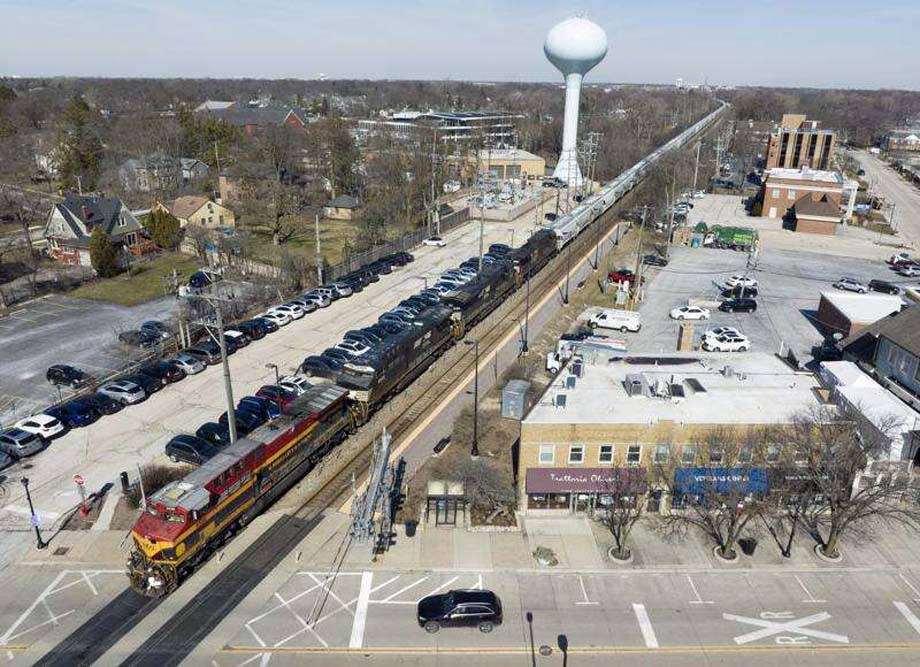
Arlington Heights Illinois USA
Chicago Illinois US - One year after a hotly contested railroad merger, suburban leaders report
lengthy and more frequent freight trains, and they're preparing for a future deluge.
The U.S. Surface Transportation Board (STB) approved Canadian Pacific's $31 billion acquisition of Kansas City Southern
on 15 Mar 2023 creating the first rail system stretching from Canada to Mexico.
 Suspect that date is incorrect.
Suspect that date is incorrect.
"I don't think it's a doomsday scenario right now," Bensenville Village Manager Evan Summers said. But,
"there are more trains."
And a 32 minute blocked crossing that snarled traffic in late December doesn't augur well, he noted.
"Thank God, we didn't have an emergency during that blockage. We wouldn't have been able to get to the
emergency," Summers said.
Over the next few years, CPKC will add eight more trains daily compared with an average of three before the merger in
the region.
The railroad introduced a pair of trains last spring between Chicago and Mexico.
That means a daily average of 4.6 trains between Bensenville and Elgin, or about 32 a week, in contrast with 21
pre-merger.
"One year into our combination, the new CPKC network is doing what we said it would do. It's improving safety,
enhancing competition, providing customers with new service options, enabling investments, reducing greenhouse gas
emissions, and driving economic growth across North America," spokesman Patrick Waldron said.
Some towns are turning to infrastructure to counter the extra freights, such as a grade separation in downtown
Bensenville.
But at US$70 million, it's a formidable cost.
The Itasca Fire District has moved some equipment north of the tracks to the village public works garage and is
planning a permanent station to handle calls when CPKC freights block crossings.
"We're going to be proactive and take care of the problem head-on before it becomes a problem," Itasca Mayor
Jeff Pruyn said.
But infrastructure won't stop an eruption of train horns, Pruyn and Elgin Mayor David Kaptain reported.
The Coalition to Stop CPKC, comprising Bartlett, Bensenville, DuPage County, Elgin, Itasca, Hanover Park, Roselle, Wood
Dale, and Schaumburg has appealed the STB's ruling in federal court.
Metra also opposed the merger, arguing it would delay commuters and cause safety issues.
Since September, Bensenville has reported 85 blocked crossings of more than 10 minutes.
The coalition also noted that CPKC ran five freights trains longer than 10,000 feet in the western suburbs one week
last October.
CPKC, however, said the median length for trains has decreased since the merger, citing an average of 7,041 feet before
and 5,965 after.
Elgin's Kaptain has seen an incremental spike in trains and blocked crossings.
"I do notice the traffic gets backed up at 06:30 when people are starting to go to work," he
said.
The STB imposed a seven-year monitoring period on CPKC and ordered the railroad to appoint a community
liaison.
But there have been disconnects over a blocked-crossing alert system and hazardous materials training for firefighters
and police, coalition officials said.
"The relationship has been contentious, we don't want the trains here, and they obviously need the trains
here," Summers said.
One More Thing
In 2008, the STB approved another controversial railway merger between CN and the EJ&E.
CN was mandated to provide information about train numbers and crossing delays and that data was easily available
online.
The STB also ordered CPKC to report train numbers and lengths.
The railroad has, but accessing it requires digging into STB records, downloading spreadsheets, and knowing highly
specific railroad facts, such as what is Tower B-17.
Marni Pyke.
(likely no image with original article)
(usually because it's been seen before)
provisions in Section 29 of the
Canadian Copyright Modernization Act.
